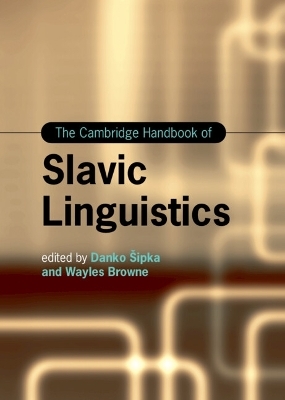
The Cambridge Handbook of Slavic Linguistics
Cambridge University Press (Verlag)
978-1-108-83267-0 (ISBN)
The linguistic study of the Slavic language family, with its rich syntactic and phonological structures, complex writing systems, and diverse socio-historical context, is a rapidly growing research area. Bringing together contributions from an international team of authors, this Handbook provides a systematic review of cutting-edge research in Slavic linguistics. It covers phonetics and phonology, morphology and syntax, lexicology, and sociolinguistics, and presents multiple theoretical perspectives, including synchronic and diachronic. Each chapter addresses a particular linguistic feature pertinent to Slavic languages, and covers the development of the feature from Proto-Slavic to present-day Slavic languages, the main findings in historical and ongoing research devoted to the feature, and a summary of the current state of the art in the field and what the directions of future research will be. Comprehensive yet accessible, it is essential reading for academic researchers and students in theoretical linguistics, linguistic typology, sociolinguistics and Slavic/East European Studies.
Danko Šipka is Professor of Slavic languages and linguistics at Arizona State University. His research interests include lexicography, lexicology, and cultural linguistics. Recent publications include Lexical Conflict (2015), and The Geography of Words (2021). Wayles Browne is Professor Emeritus of linguistics at Cornell University. His interests include Bosnian-Croatian-Serbian, Rusyn, Ukrainian, Polish and Belarusian; clitics and other syntactic phenomena; and translation. He is book review editor of the Journal of Slavic Linguistics.
Slavic linguistics introduction Wayles Browne; 1. Word stress Draga Zec; 2. Vocalism: the vowels Irena Sawicka; 3. Consonantism: the consonants Peter Jurgec; 4. Syllable structure Alexei Kochetov; 5. Phonologically conditioned alternations Darya Kavitskaya; 6. Prosodic reflexes of information structure Radek Simík; 7. Inflectional endings: declensions Marek Majer; 8. Inflectional endings: conjugation Ian Press; 9. Tense and mood forms Hagen Pitsch; 10. Aspect in verbs Stephen M. Dickey; 11. Lexical derivation Frank Y. Gladney; 12. Lexical composition Mate Kapović; 13. Agreement Jana Willer gold; 14. Wh-constructions and wh-dependencies Barbara Citko; 15. Coordination and subordination in slavic languages Milan Mihaljević; 16. Numerals and quantity expressions Steven Franks; 17. Placement and ordering of the (en)clitics Lanko Marušič, Petra Mišmaš and Rok Zaucer; 18. Secondary predication Nerea Madariaga; 19. Negation and polarity Luka Szucsich; 20. Null subjects Alina Lsraeli; 21. Voice Jasmina Milićević; 22. Morphosyntactic reflexes of information structure Elena Titov; 23. The structure of the lexicon Valentina Apresjan and Alexei Shmelev; 24. Lexical semantics (insights from lexicology) Rajna Dragićević; 25. Lexical borrowing Rajna Dragićević; 26. Sociolinguistic variation in slavic languages Serge Sharoff; 27. False cognates Danko Šipka and Mladen Uhlik; 28. Dialectal fragmentation Joseph Schallert; 29. Language contacts Dieter Stern; 30. The slavic literary micro-languages Motoki Nomachi; 31. Heritage language forms Oksana Laleko; 32. Scripts Daniel Bunčić; 33. Orthographies Daniel Bunčić; 34. Psycholinguistics and language acquisition Tanya Ivanova-Sullivan and Irina A. Sekerina; 35. Natural language processing Tomaž Erjavec.
| Erscheinungsdatum | 14.05.2024 |
|---|---|
| Reihe/Serie | Cambridge Handbooks in Language and Linguistics |
| Zusatzinfo | Worked examples or Exercises |
| Verlagsort | Cambridge |
| Sprache | englisch |
| Maße | 177 x 250 mm |
| Gewicht | 1540 g |
| Themenwelt | Schulbuch / Wörterbuch ► Wörterbuch / Fremdsprachen |
| Geisteswissenschaften ► Sprach- / Literaturwissenschaft ► Sprachwissenschaft | |
| ISBN-10 | 1-108-83267-9 / 1108832679 |
| ISBN-13 | 978-1-108-83267-0 / 9781108832670 |
| Zustand | Neuware |
| Informationen gemäß Produktsicherheitsverordnung (GPSR) | |
| Haben Sie eine Frage zum Produkt? |
aus dem Bereich


